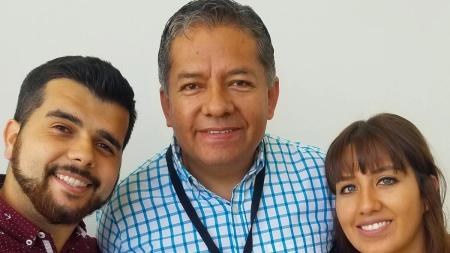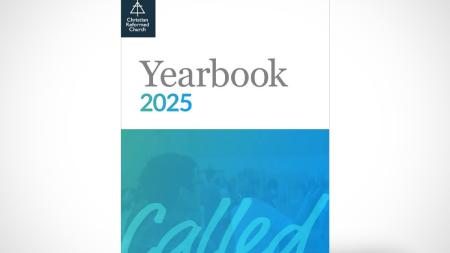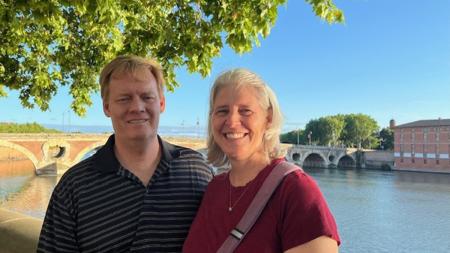CRC Group Visits US/Mexico Border

Vigil to honor the lives of migrants that have died in the desert on the US side.
Christy Berghoef
The Christian Reformed Church’s Office of Social Justice led a group of 20 pastors and others to the Arizona- Mexico border from March 9-12 to expose them to issues of immigration that people on both sides of the border are facing.
The host organization, La Frontera de Cristo, is a binational Presbyterian ministry that works along the border in Agua Prieta, Mexico and Douglas, Arizona.
Participants came from California, Iowa, New Jersey, and Michigan. The trip included four members of the Reformed Church in America as well.
Kelsey Herbert, a Congregational Mobilizer Fellow for the Office of Social Justice, says a goal of the trip was to encourage a greater dialogue in churches about looking at immigration from a faith-based perspective.
“Only about 10 percent of evangelicals say their faith influences their position on immigration. This makes sense when only about 20 percent of Christians have heard immigration talked about from the pulpit,” she says.
“We are working to change this. The OSJ wants to equip pastors and people of faith to engage immigration from a biblical perspective, recognizing the call to welcome the stranger and speak out for justice.”
On the first night, La Frontera de Cristo led the group through a biblical reflection along the fence that separates the United States and Mexico.
“Along the way, we met a Mexican Christian family that had lost their nephew in a border patrol shooting right where we were standing,” said Kate Kooyman, coordinator for Restorative Justice for OSJ.
“With our group on the U.S. side, and the family on the Mexico side, we extended our hands through the fence and prayed for this family. The body of Christ is certainly without borders, but the symbolism of that wall which separated us in that moment was profound.”
At one point, they saw two young people in the distance running through the desert after just having crossed the border only to be apprehended minutes later.
Herbert says they were up on a hill and could see them running north and then the border patrol coming from the west.
“I felt like I was watching a movie. When they got caught, I felt like someone had just punched me in the stomach because it was not a movie. These are real people, with real struggles, families, and dreams. This moment truly humanized this issue for me,” said Herbert.
The OSJ group also took part in a vigil that has been happening every Tuesday night since 2000 to remember/honor the lives of migrants who have died in the desert.
“We stood in a single file line. One by one we read aloud the names of individuals who died attempting to cross the border,” says Kris Van Engen, Congregational Mobilizer for the CRC.
For every name, they placed a white cross on the street leading from a memorial towards the U.S. Mexico border station. When the cross was placed the entire group shouted the word, "presente!" — meaning this person remains present with Jesus and present with them, he said.
“We continued the litany until over 300 crosses were placed along the roadside, a total distance of over quarter of a mile. The experience was a stark reminder of how just how human, even to the point of death, immigration is and how the love that Jesus has towards immigrants is beyond human understanding.”
They also learned how churches are addressing root causes of migration through visiting a direct-trade coffee cooperative called Cafe Justo.
In addition, they met with a Christian border patrol officer, visited a migrant resource center and shelter for those who had just been deported, and learned about migration within Mexico,
“I was reminded of something we can so often forget, that all human beings—no matter their circumstances, job title, criminal record, political bent, or legal status—are images bearers and beloved of God. Until we see the migrant in this way, we cannot expect our policy making to be kingdom-minded,” said Jordan
Humm, a first-year divinity student at Calvin Seminary.
Daniel Mouw, pastor of South Grandville Christian Reformed Church in Grandville, Mich. said he knew before he went on the trip that immigration policy is complicated. But the journey to the border underscored that it is far more complicated than he realized.
He says it became clear to him that popular slogans and quick and easy solutions are not at all helpful in looking at this issue from a biblical perspective.
“I also heard stories that demonstrate that the current immigration policy needs revamping; it is too complicated, too uneven, and too disruptive for far too many families,” he says.
“As Christians, we have a deep compassion for the poor, a respect for law, a Christ-like empathy for desperate people, a passion for justice that respects the dignity of every human being, a commitment to fairness,” he said.
But then, he asks, how can Christians help bring all those convictions together into shaping a thoughtful and wise immigration policy?
“We have our work cut out for us,” he said. “The Christian community needs to be talking together about this and communicating with our leaders. And we need to get those conversations started now because of the lives of millions of marginalized people are hanging in the balance.”
Click here to review OSJ’s resources on immigration.


